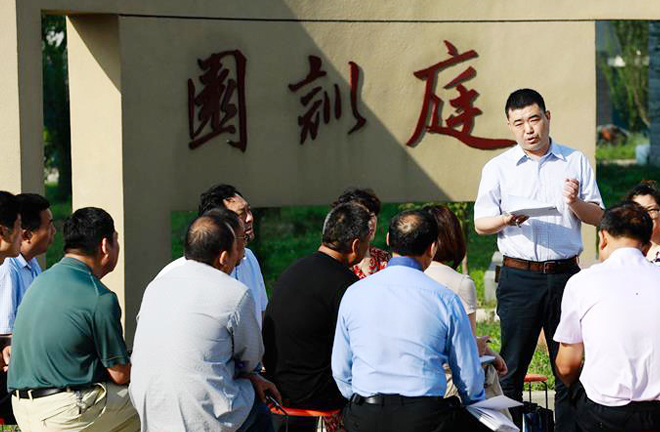National governance pursues modernization through reform

An official from the Disciplinary and Supervisory Department of Xuyi County, Jiangsu Province, explains laws to people in Mangang Community, Taihe Subdistrict. Photo: XINHUA
The overall goal of deepening reform in every field is to improve and develop the system of socialism with Chinese characteristics and modernize China’s system and capacity for governance. We should push forward the modernization of national governance through continuously deepening reform while ensuring the reform and opening up through the modernization of national governance.
The pursuit of modernization is one of the Chinese people’s dreams. Xu Yaotong, a professor from the Party School of the Central Committee of the CPC (a.k.a. Chinese Academy of Governance), said that the modernization of national governance is the latest achievement toward modernization, and it has perfected our overall understanding of modernization. The goal of modernizing China’s system and capacity for governance is the result of the CPC’s emphasis on and constant pursuit of modernization.
The right ideological guidelines have been an important foundation for the magnificent achievements of the reform and opening up. Jiang Yingzhou, director of the Department of Teaching and Research of Scientific Socialism (Politics) under the Party School of the Chongqing Municipal Committee, put forward that over the past 40 years, arguments about our ideology have basically revolved around the reform and opening up. In the new era, we should enhance the Four Consciousnesses (our consciousness of the need to maintain political integrity, think in big-picture terms, follow the leadership core and keep in alignment with the Central Party leadership) and establish the Four Confidences (keep confidence in the path, theory, system and culture of socialism with Chinese characteristics) so as to build as much consensus as possible, to be united as one, and to deepen the reform. New development ideas are needed to guide the practice of reform, and a favorable environment for the development of ideology and culture should be created to realize the two centenary goals.
Yang Xuedong, head of the Department of Party Literature translation under the Central Compilation and Translation Bureau, said that generally speaking, there have been three stages and three themes of institutionalization over the past 40 years of the reform and opening up. The first stage lasted from the 1980s to the late 1990s, with the theme of enriching the number of entities and promoting their developmental vitality. The second stage appeared after 2000, with the theme of maintaining social order and harmony. The third stage appeared after the 18th National Congress of the Communist Party of China, with the theme of the modernization of national governance.
These three stages and themes describe China’s gradual institutionalization, presenting the logic of the modernization of a major country. China’s institutionalization is marching toward maturity and stability with reform still as its main theme. In future development, we should sustain the power of institutionalization, continue to enhance the consensus of the different entities of institutionalization through the deepening of reform, continue to interpret conceptual systems from the current form and procedure, continue to effectively balance the relationship between international expectations and domestic demands, and continue to properly solve problems such as the relationship between key actors and institutions.
(edited by SU XUAN)

 PRINT
PRINT CLOSE
CLOSE